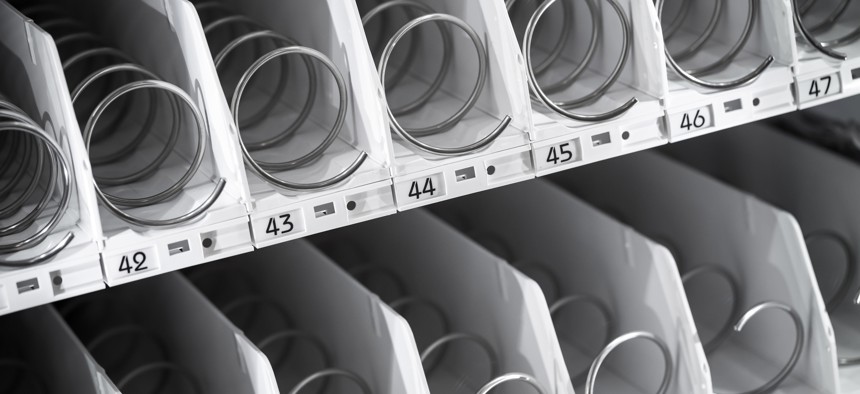Milwaukee County Set to Install Harm-Reduction Vending Machines

eugenesergeev via Getty Images
The initiative aims to reduce drug overdose deaths.
Over the last few years, Milwaukee County has repeatedly broken its own record of overdose deaths. But with millions in opioid settlement funds in hand, local officials are turning to an increasingly popular approach to combat drug-related deaths: harm-reduction vending machines.
Last month, the county unveiled the first such harm-reduction vending machine that will dispense products like the opioid overdose treatment Narcan, fentanyl test strips and drug deactivation pouches to destroy unwanted medications. Over the next three years, another two dozen machines will be installed across the county.
Vending machines are an attractive harm-reduction approach because they’re easy to use and they provide a centralized place to access a variety of products, said Jeremy Triblett, the county’s prevention services coordinator.
“The intention with Milwaukee County is to saturate our community with resources," he said, "so that we can increase people's access to them in a more equitable fashion and then simultaneously educate the community on what these things mean and how to use them.”

The expression "harm reduction" refers to strategies that minimize the health risks of using drugs, such as contracting HIV or overdosing. It can take many forms, like safe injection sites or syringe exchanges. These practices have been in play in Europe and Australia for decades, but have only recently gained traction in the United States.
The movement comes as billions of dollars in court settlement funds are headed to state and local governments around the country for addiction treatment and prevention initiatives.
Between May 2020 and April 2021, more than 100,000 people died nationwide as a result of drug overdoses, according to the Centers for Disease Control and Prevention.
Communities from San Diego to New York City have launched vending machine initiatives, and the success of those programs inspired Milwaukee County’s plan, Triblett said. Las Vegas was one of the first cities in the country to establish harm-reduction vending machines in 2017, and a machine in Cincinnati is credited with saving hundreds of lives since it was installed two years ago.
Milwaukee County’s vending machine initiative appears to be one of the largest in the country, according to Triblett. The machines are part of 15 initiatives in Milwaukee County funded by $11 million in opioid settlement funds and the county will continue receiving additional funds over the next 18 years.
In 2021, Wisconsin hit a record high of 1,427 opioid-related deaths, up 70% from 2018. Within the state, Milwaukee County has one of the highest overdose death rates, according to the county, and has seen record-high numbers of overdose-related emergency calls. Last year, at least 491 people fatally overdosed, but that figure has not been finalized and it could be higher.
The scale of Milwaukee's vending machine program aims to match the depth of the problem in the county, which is comprised of 19 municipalities. The program seeks to install a machine in each jurisdiction, with multiple machines in the areas that recorded the most deaths.
The county has been purchasing and disseminating harm-reduction products for years, Triblett said, and the vending machines are the latest tool to get the products to those who need them most. The initiative’s only major expense is the upfront cost of the machines themselves, he added, and the county has a contract with the machine manufacturers to repair any should they break.
The first 11 machines will be installed this year and the county prevention services office is accepting applications from local groups interested in hosting one on their property. The application is open to a variety of organizations, including nonprofits, faith organizations and restaurants, Triblett said. Officials will use data about where the most fatalities occur to help determine where the machines will go.
“We particularly wanted to really invest in [the vending machines] as an opportunity to increase people's access to harm-reduction provision supplies where they are in their neighborhoods, using agencies that they frequent and feel most comfortable with,” Triblett said. “It's a great way to make sure we don't have to be everywhere at all times.”
Molly Bolan is the assistant editor for Route Fifty.
NEXT STORY: New Jersey Bill Would Track Deadly Car Crashes Involving Marijuana






